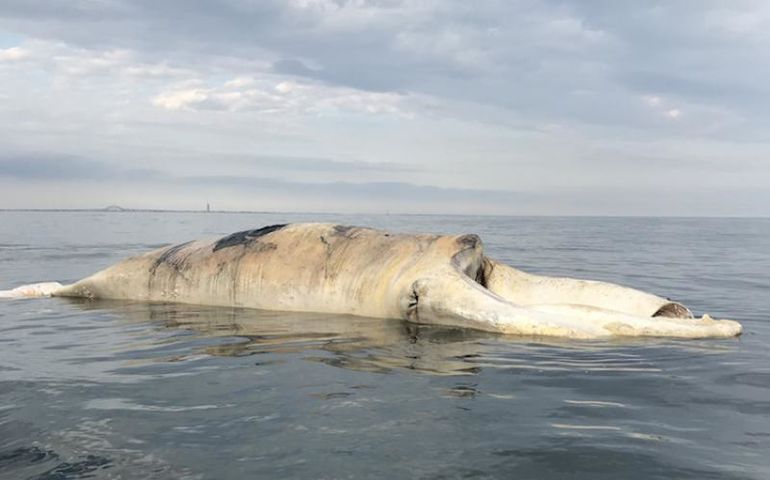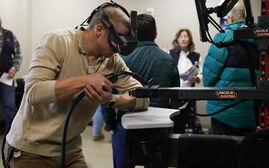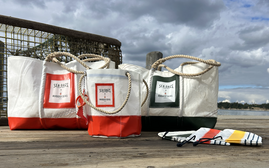Golden seeks more details on whale strandings elsewhere in the Northeast
 National Oceanic and Atmospheric Administration
A dead North Atlantic right whale found floating south of Long Island, N.Y., in September 2019.
National Oceanic and Atmospheric Administration
A dead North Atlantic right whale found floating south of Long Island, N.Y., in September 2019.
A Maine lawmaker wants federal officials to reveal undisclosed information related to recent whale deaths along the East Coast, citing oft-raised but currently unsupported concerns that offshore wind development activities are at fault.
In a Feb. 27 letter to two top federal officials, U.S. Rep. Jared Golden, D-Maine, 2nd District, said he wants National Oceanic and Atmospheric Administration to voluntarily release deeper details of any necropsies — essentially, animal autopsies — performed on whale carcasses. Currently, NOAA considers that information, categorized as Level B and Level C data, to be proprietary and has no legal requirement to publicize it.
In the past two months, at least 18 whales have been found ashore along the Atlantic coast, primarily humpback whales and North Atlantic right whales.
In a press release about his letter to Janet Coit, assistant administrator of the National Marine Fisheries Service, and Gina Raimondo, secretary of the U.S. Department of Commerce, Golden included quotes supporting his request from the two lobster industry executives: Maine Lobstering Union Director Virginia Olsen and Maine Lobstermen’s Association Executive Director Patrice McCarron. The lobster industry has long fought against regional offshore wind development, citing potential conflict between project sites and fishing grounds.
NOAA declined a request for an interview by Mainebiz.
Whenever stranded marine mammals wash ashore, NOAA collects and releases basic event information, such as the location and status of the animal, referred to as Level A data. Level B and Level C data include information like offshore human, predator and prey activity, as well as the results of toxicology, virology and parasitology tests, among other details, according to a 2020 guide issued by the agency outlining how someone examining a stranded marine mammal should proceed.
Golden wrote that NOAA should make these additional layers of information available so that “ocean stakeholders can better understand” if offshore wind activities are mortally harming whales, “given that the sudden increase in whale deaths is occurring at a time when the Biden Administration proceeds with authorizing large-scale commercial offshore wind projects along the East Coast.”
However, suggestions that the deaths could be the result of offshore wind-related activities have been called unfounded and the result of misinformation, according to reports from numerous national outlets, including NPR. A recent Politifact article noted that experts say the “leading human causes of large-whale strandings are whales being struck by vessels or becoming entangled in fishing lines.”
Golden acknowledged that NOAA has said “unequivocally” that offshore wind activities aren’t connected to the mortalities but requested authorities “elaborate on this claim and provide … justification for reaching this conclusion.”













0 Comments